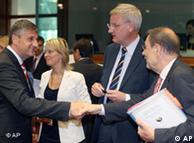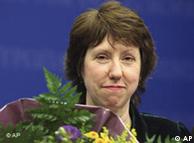European Union | 25.11.2009
The EU aims for a single voice in foreign policy
In order to speak with a united voice, the European External Action Service (EEAS) - in effect a foreign ministry and diplomatic corps under the authority of the High Representative for Foreign Affairs and Security Policy - will cooperate with the diplomatic services of all 27 EU member states and merge the corresponding departments in the bloc's Commission and Council.
Cristina Gallach, a spokeswoman for current EU foreign policy chief Javier Solana, told Deutsche Welle that while it would take years before the EEAS was fully developed, the new institution was well worth it: "Despite the fact that we are all part of the EU, coordination isn't always streamlined, sometimes one action lags behind the other," Gallach said.
The independent institution will be headed by Britain's Catherine Ashton, the bloc's new foreign policy supremo and vice-president of the Commission.
Watch out for national agendas  Bildunterschrift: Großansicht des Bildes mit der Bildunterschrift: There are 27 EU foreign ministers; now there's an "EU foreign minister" as well
Bildunterschrift: Großansicht des Bildes mit der Bildunterschrift: There are 27 EU foreign ministers; now there's an "EU foreign minister" as well
Franziska Brantner, a foreign policy spokeswoman for Germany's Green Party in the European Parliament, said it was up to Ashton to seize the initiative more than Solana did; Ashton should also oppose national agendas. The European External Action Service's orientation depended on Ashton, Brantner added.
The new EU "Foreign Minister" merges the positions currently held by Foreign Policy chief Javier Solana and External Relations Commissioner Benita Ferrero-Waldner, creating a link between two EU bodies, the Council and the Commission.
The merger does not affect individual member states' foreign policies, and no EU member will have to give up its embassy in favour of an EU embassy. But there are some who think it would be not be a bad idea if they did, like German conservative deputy Klaus-Heiner Lehne: “I believe having national foreign services is, for the most part, superfluous", he said.
The countdown is on
But the question whether the EEAS will one day take over consular tasks or grant EU visas, has not been resolved. Initially, Ashton will be working out EEAS specifics with a small group of experts from the Council, the Commission and the EU nations' diplomatic services.
"The European Commission has more than 130 offices all over the world; they are all well received, but if we give these bureaus the opportunity of politically representing the union, they will be able to work even more efficiently," Cristina Gallach said.
Diplomacy will be necessary from the start in creating the European External Action Service: when Catherine Ashton presents the EU's heads of state and government in April 2010 with proposals on how best to organize the EEAS, her concept is expected to be as cost-conscious as possible, to the satisfaction of all.
Author: Susanne Henn, Brussels (db)
Editor: Michael Lawton


αλήθεια είναι δυνατόν να πληροφορηθούμε τις απολαβές των ιθυνόντων των Βρυξελών;
ReplyDelete